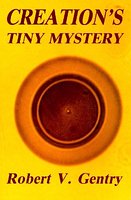|
Earth Science Associates |
||||||||
|
|||||||||
|
Creation's Tiny Mystery |
|||||||||
|
|
[p. 93] The Arkansas Trial: A Difficult DecisionOn the morning of October 27, 1981, a long-time friend called to inform me that he had been asked to testify as an expert witness at the forthcoming Arkansas creation trial. He mistakenly thought an invitation had already been extended for me to testify as well. Upon learning this was not the case, he informed the Arkansas Attorney General's office of my work. Later that same day I received a telephone call from the Attorney General's office requesting me to provide them with reprints and other pertinent data relative to my findings. A few days later the Deputy Attorney General asked me to testify for the State as an expert witness for creation science. I knew that my involvement in the trial could eliminate any hope of continuing at the Laboratory. If my testimony at the trial were misrepresented in print, it would almost certainly jeopardize my research at ORNL. In September 1981, a few months before the trial, a prominent evolutionist had also called and urged me in a cordial way not to risk incurring the ill will of the scientific community by testifying for the State. He suggested that my reputation as a scientist would undoubtedly suffer if I did, and I was inclined to agree with him. Until I received the October call, it seemed that my presence at the trial would be a needless risk. Several factors led me to change my mind about testifying for the State. They have all come into much sharper focus since the trial, as will be seen in the remainder of this chapter. First of all, it was and still is difficult for me to follow the logic and consistency of the American Civil Liberties Union (ACLU) in their opposition to Act 590. They claimed that this Act, in requiring balanced treatment of evolution and creation science, constituted the establishment of religion, thus violating the First Amendment. And yet witnesses at court trials swear by God to tell the truth, and the courts themselves are opened with a reference to God. Also, both branches of the U.S. Congress are often begun with reference to the God of the Judeo-Christian ethic. A striking example of this practice was given in the opening prayer for the House of Representatives on April 29, 1982:
This explicit reference to the Creator is recorded in the Congressional Record. It is available to all Americans, including public school students studying American government. Thus far, such reference to the Creator has always been deemed consistent with the First Amendment and the academic freedom granted to both student and teacher. And if public schools may refer to the Creator in the context of an American history class, on what basis is it wrong for them to refer to scientific evidences of creation in a science class? Just as relevant to this issue is the Declaration of Independence itself: We hold these truths to be self-evident, that all men are created equal, that they are endowed by their Creator with certain unalienable Rights, that among these are Life, Liberty, and the pursuit of Happiness. Every state in the union uses these words to inform public school children of the Creator. Why, then, would it be illegal for the states to inform the same students of the scientific evidences of creation?
|
|
||||||
|
|
|||||||||
|
|||||||||
|
Earth Science Associates
|
|||||||||


